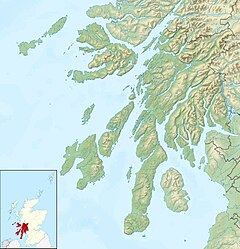Tighnabruaich
Tighnabruaich
|
|
|---|---|
 Tighnabruaich Lifeboat Station of the Royal National Lifeboat Institution. |
|
| Tighnabruaich shown within Argyll and Bute | |
| OS grid reference | NR 98000 72900 |
| Council area |
|
| Lieutenancy area |
|
| Country | Scotland |
| Sovereign state | United Kingdom |
| Post town | DUNOON, ARGYLL |
| Postcode district | PA21 |
| Dialling code | 01700 |
| EU Parliament | Scotland |
| UK Parliament |
|
| Scottish Parliament |
|
Tighnabruaich; (![]() i/ˌtaɪnəˈbruːəx/; Scottish Gaelic: Taigh na Bruaich) is a village on the Cowal peninsula, on the western arm of the Kyles of Bute in Argyll and Bute, Scotland. In 2011 the population was 660. It is west of Glasgow and north of the Isle of Arran. The road to Ormidale was built in the late-1960s and until then the village was more reliant on the sea for the transport of passengers and freight.
i/ˌtaɪnəˈbruːəx/; Scottish Gaelic: Taigh na Bruaich) is a village on the Cowal peninsula, on the western arm of the Kyles of Bute in Argyll and Bute, Scotland. In 2011 the population was 660. It is west of Glasgow and north of the Isle of Arran. The road to Ormidale was built in the late-1960s and until then the village was more reliant on the sea for the transport of passengers and freight.
A pier was possibly built in the 1830s by the Castle Steamship Company, a forerunner of MacBrayne. Its was a stopping place for paddle steamers and Clyde puffers. The wooden pier was rebuilt in 1885 by the Tighnabruaich Estate who owned it from 1840 until 1950. George Olding owned it until 1965 when it became the responsibility of the local council.
Passenger services on and around the Clyde were developed after the PS Comet was introduced into service in 1812 and tourism developed with the introduction of cruises through the Kyles around Bute, to Arran and along Loch Fyne. The pier is used by the paddle steamer Waverley. Its Royal National Lifeboat Institution inshore lifeboat station currently has an Atlantic 85 type lifeboat and tractor on station.
...
Wikipedia

